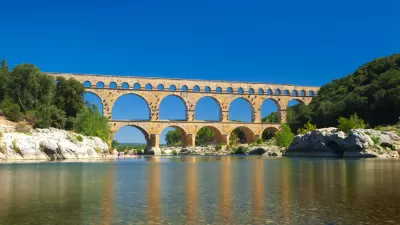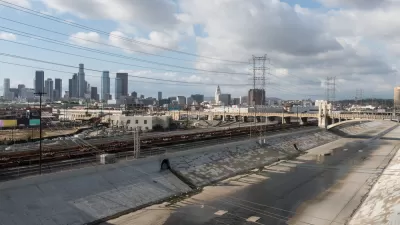Los Angeles made progress toward revitalizing the L.A. River when the preferred restoration plan won an important approval. But the project also saw a jump in price and a change in cost-share, leaving some wondering where the money will come from.
The broad coalition involved in the revitalization project includes the mayor’s LARiverWorks team and the LA River Revitalization Corporation, as well as established community organization Friends of the Los Angeles River (FoLAR). FoLAR founder Lewis MacAdams and City of Los Angeles Deputy Mayor Barbara Romero, who oversees LARiverWorks, gave The Planning Report their expert perspectives on the questions facing the river’s future.
The new $1.36-billion price tag may be daunting, but development of the river is by all accounts a long-term investment—the city's master plan has a 25-to-50-year horizon. And, MacAdams points out, “People are not batting an eye about spending $2 billion to buy the Clippers or to build a football stadium. This project will bring a lot more happiness to a lot more people than a football team will.”
The real issue, says MacAdams, is the amount of that total cost currently expected to come from local sources: "The 80-20 split between local and federal funding needs to be changed, because it puts parts of the restoration in danger."
Possible options to cover the local share of the plan include establishing an Enhanced Infrastructure Financing District—a state financing tool the city’s been eyeing since it came into effect this year.
MacAdams and Romero agree on many fronts, but the question of governance revealed differing views.
According to MacAdams, an artist-turned-activist whose work on the river has spanned five mayoral administrations, Los Angeles' governance structure for the river is “obsolete.”
The L.A. River Revitalization Corporation’s decision to bring on Frank Gehry didn't inspire a vote of confidence from the longtime community activist. MacAdams called Gehry’s involvement an example of “top-down planning…the opposite of what Friends of the Los Angeles River is about.” Gehry’s suggestion that he may retain the river’s concrete has also raised some concerns about his vision’s compatibility with Alternative 20.
But Romero says the mayor’s creation of the LARiverWorks team already signals a collaborative approach, bringing city departments together in cooperation with the private sector and regional bodies. To make drastic changes at this point, she says, would be premature until solid funding is identified:
“Ultimately, governance is about funding. I don’t think we’ll go with a new governance structure if there’s no money attached to it. We have some work to do collectively to determine: What is our priority in these next several years in implementation? I think the number one priority today is starting to put more significant projects on the ground.”
FULL STORY: Romero and MacAdams: Who Will Plan & Fund LA River Revitalization?

Maui's Vacation Rental Debate Turns Ugly
Verbal attacks, misinformation campaigns and fistfights plague a high-stakes debate to convert thousands of vacation rentals into long-term housing.

Planetizen Federal Action Tracker
A weekly monitor of how Trump’s orders and actions are impacting planners and planning in America.

In Urban Planning, AI Prompting Could be the New Design Thinking
Creativity has long been key to great urban design. What if we see AI as our new creative partner?

Pedestrian Deaths Drop, Remain Twice as High as in 2009
Fatalities declined by 4 percent in 2024, but the U.S. is still nowhere close to ‘Vision Zero.’

King County Supportive Housing Program Offers Hope for Unhoused Residents
The county is taking a ‘Housing First’ approach that prioritizes getting people into housing, then offering wraparound supportive services.

Researchers Use AI to Get Clearer Picture of US Housing
Analysts are using artificial intelligence to supercharge their research by allowing them to comb through data faster. Though these AI tools can be error prone, they save time and housing researchers are optimistic about the future.
Urban Design for Planners 1: Software Tools
This six-course series explores essential urban design concepts using open source software and equips planners with the tools they need to participate fully in the urban design process.
Planning for Universal Design
Learn the tools for implementing Universal Design in planning regulations.
planning NEXT
Appalachian Highlands Housing Partners
Mpact (founded as Rail~Volution)
City of Camden Redevelopment Agency
City of Astoria
City of Portland
City of Laramie





























